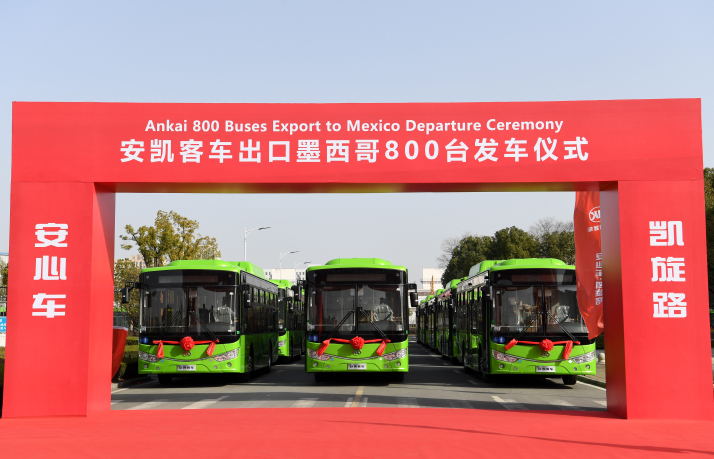| Voice |
| Growth engine of the world | |
|
|
 Departure ceremony of 800 buses ready for export in the Anhui Ankai Automobile Co. Ltd. in Hefei, Anhui Province, on March 8 (XINHUA)
For Mexican professor Gerardo del Rivero Maldonado, holding a Ph.D. in economics from the Autonomous University of the State of Mexico (UAEM), China's unprecedented economic growth can be attributed to the large investment its government has poured into the education sector. This has allowed "Asia's giant" to lead the world's scientific revolution and stand at the forefront of universal exploration, he said. This is how Maldonado, a full-time academic passionate about everything that China represents, sees things. He feels this driving force every day, practically every hour, inside the classroom as a scholar, as a professor, but also as director of one of the university's institutions where he provides students with a better understanding of the "Chinese phenomenon," the current No.1 topic of worldwide social and economic studies. For Maldonado, this new wonder, very different from the one experienced during the second half of the 20th century dominated by Europe and the United States, is tremendously appealing. It offers another way of explaining ongoings in the international arena—through a lens very different from that of the West. "Not everything has to come from what social scientists in the U.S. and Europe propose. There are other ways to perceive world development," he added. Solid proof of what he says are the theses, congresses and diploma courses that universities worldwide dedicate to this topic. Maldonado, too, plays his part: He currently teaches doctoral-level political organization and economics of Asia at the UAEM's Faculty of Economics. In addition, as director of the Instituto Universitario y Tecnológico del Estado de México, Maldonado has promoted something unprecedented in the country: teaching Chinese language and culture to freshmen students of Bilingual International Business beginning from their first semester and crossing the timespan of their major. This is part of a comprehensive training for students who seek to forge an academic bond with China; the first generation with this new curriculum is set to graduate in July 2023. In Mexico's public and private universities, standard Chinese is taught as an optional subject with no specific career focus, something that Maldonado sought out to fix through this academic proposal. "Chinese is the language of the future, the one that is destined to compete directly with English; this can open up many opportunities for our youth," he explained. Maldonado also believes that, "since the 1970s, China has played an essential role in an increasingly globalized world." Maldonado as of yet has not visited China in person, but he can already imagine what that trip will one day look like. "When traveling abroad, I never like to go as a tourist. I prefer to see the places locals visit. I like going to markets and getting on buses or subways to better understand a city's social dynamic. That's what I would, and hopefully will, do," he concluded.  Gerardo del Rivero Maldonado is an expert on Chinese politics and economy (COURTESY PHOTO)
Q&A with Professor Gerardo del Rivero Maldonado
What do you think is the relevance of Mexican students learning Chinese? Maldonado: To start off, Chinese society and culture are far removed from our immediate reality. The fact that our students can acquire a command of the language and also learn about Chinese culture gives them the opportunity to learn about a society that is completely different and, more importantly, to understand it. It also gives them the chance to explain the social and economic phenomena that occur in the world from a perspective that isn't necessarily that of the West. The fact young people can get closer to Chinese culture will allow them to understand how social and economic interactions can also be based on other principles. We must step away from a one-sided vision, outdated since the end of the last century, and take into account that the world is becoming increasingly diverse. And there is something even more important. Language bridges something that is fundamental between individuals: communication. By learning Chinese, students will be able to interact with each other because there will already be a common denominator. What new career prospects does studying Chinese bring students? We think that by learning a new language, students can become more eligible for entry into other educational institutions. Based on their command of standard Chinese, they may apply for a scholarship and get into a Chinese university—if they choose to do so. The purpose is for students to have more and better options of continuing their academic training or, be able to join a Chinese company operating in Mexico. The fact that Mexico borders the U.S. is also an opportunity for Chinese companies that wish to export to North America. We want to give our students the best tools so they can qualify for overseas jobs or studies. We feel a great social commitment toward young people because we are paving the way for them to attain their personal goals and contribute to our country's economic growth. As an economist, what's your take on China's economic growth? Let's be honest: The world's economic development cannot be understood without taking into account the People's Republic of China as a growth engine. One of the fundamental elements behind the unprecedented increase of China's GDP is the investment its government has poured into education, leading a significant number of higher education bodies to rank among the world's most renowned institutions. The commitment to training people so they can achieve high technical and scientific levels has contributed to China being at the forefront of the scientific revolution: It is a trailblazer in the development of 5G networks and, together with the U.S. and Russia, is also leading the way in space exploration. This is why China is one of the international economy's main growth engines. Its double-digit annual product growth rate in the past 20-something years has endorsed its modernization to the point of becoming the world's most important economy. To fully grasp the effectiveness of this accomplishment, we must always bear in mind that the country's process of economic modernization and opening up only took off in the late 1970s. Copyedited by Elsbeth van Paridon Comments to yanwei@cicgamericas.com |
|
||||||||||||||||||||||||||||||
|